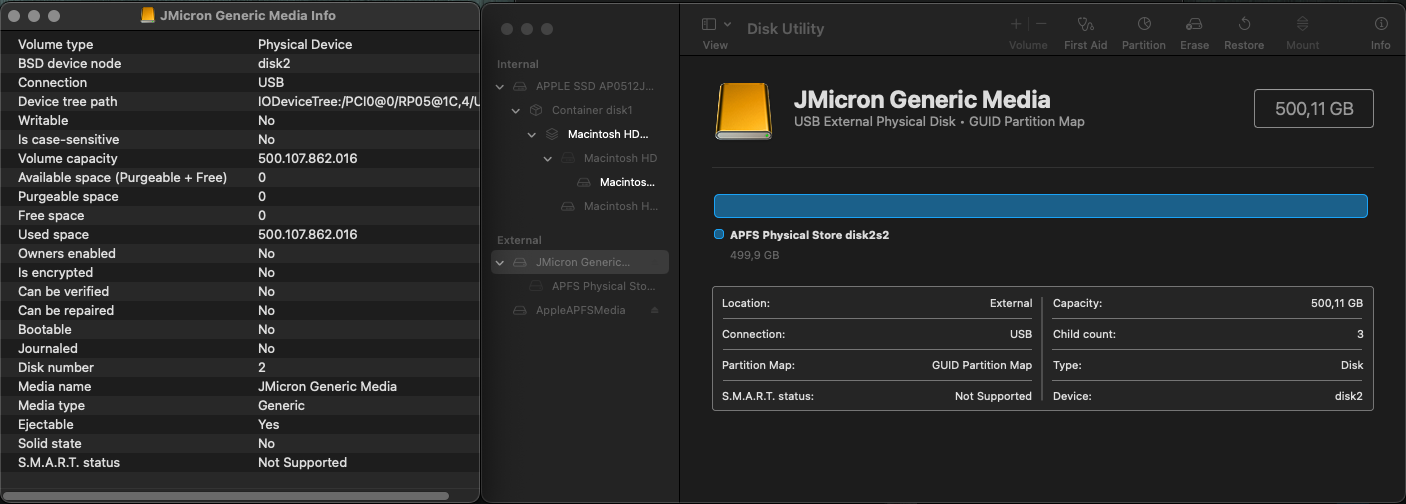I have a problem with an external disc I want to mount. In Windows, this shows as a partitioned disk with "unknown" fs-type. In MacOS, I get afps. So I guess mostly everything is ok. Anyhow, it is unable - or unwilling - to mount the disk.
When trying to mount, I get the following error: "Could not mount “disk2s2”. (com.apple.DiskManagement.disenter error -119930868.)"
When running First Aid on the disk, everything appears to be fine:
Running First Aid on “JMicron Generic Media” (disk2)
Checking prerequisites
Checking the partition list
Checking the partition map size
Checking for an EFI system partition
Checking the EFI system partition’s size
Checking the EFI system partition’s file system
Checking the EFI system partition’s folder content
Checking all HFS data partition loader spaces
Checking booter partitions
Checking booter partition disk2s3
Verifying file system.
Volume is already unmounted.
Performing fsck_hfs -fn -x /dev/rdisk2s3
Executing fsck_hfs (version hfs-583.100.10).
Checking Journaled HFS Plus volume.
The volume name is Recovery HD
Checking extents overflow file.
Checking catalog file.
Checking multi-linked files.
Checking catalog hierarchy.
Checking extended attributes file.
Checking volume bitmap.
Checking volume information.
The volume Recovery HD appears to be OK.
File system check exit code is 0.
Restoring the original state found as unmounted.
Checking Core Storage Physical Volume partitions
The partition map appears to be OK
Operation successful.
Anyhow, when running First Aid on the partition, everything falls apart:
Running First Aid on “” (disk2s2)
Checking storage system and repairing if necessary and if possible
Performing fsck_apfs -y -x /dev/disk2s2
Checking the container superblock.
warning: checkpoint 0 obj->o_type is invalid: (0x80000011)
error: object (oid 0x8b00): o_subtype invalid, o_subtype 0xe should be 0x0
warning: checkpoint 1 fsck_obj_phys failed
warning: checkpoint 2 obj->o_type is invalid: (0x80000011)
error: object (oid 0x8afd): o_subtype invalid, o_subtype 0xe should be 0x0
warning: checkpoint 3 fsck_obj_phys failed
warning: checkpoint 4 obj->o_type is invalid: (0x80000011)
error: object (oid 0x8afd): o_subtype invalid, o_subtype 0xe should be 0x0
warning: checkpoint 5 fsck_obj_phys failed
// omitted tons of more error lines
error: (oid 0x8f5e1) om: invalid o_xid (0x2c2)
error: (oid 0x8f5e1) om: invalid o_type (0x40000002, expected 0x4000000b)
error: verification/reading of the omap object failed: Illegal byte sequence
error: (oid 0x8eeae) om: invalid o_oid (0x3391)
error: (oid 0x8eeae) om: invalid o_xid (0x2dc)
error: (oid 0x8eeae) om: invalid o_type (0x3, expected 0x4000000b)
error: (oid 0x8eeae) om: invalid o_type (0x3, expected 0x4000000b)
error: verification/reading of the omap object failed: Illegal byte sequence
Checking the space manager.
Checking the space manager free queue trees.
Checking the object map.
Checking volume /dev/rdisk3s1.
Checking the APFS volume superblock.
Checking the object map.
error: (oid 0x8f542) om: invalid o_oid (0x8f515)
error: (oid 0x8f542) om: invalid o_xid (0x2be)
error: verification/reading of the omap object failed: Illegal byte sequence
The volume /dev/rdisk3s1 was found to be corrupt and cannot be repaired.
Verifying allocated space.
The container /dev/disk2s2 could not be verified completely.
Storage system check exit code is 8.
Storage system verify or repair failed. : (-69716)
Operation failed…
Now, is there any tool for Mac (or Windows/Linux) that I can use to try to repair this or at least see whats on that disk? A simple tool in the likes of Testdisk (https://www.cgsecurity.org/wiki/TestDisk) that would get me parts of whats on that disk would already be a great help!
PS: MacOS 12.5. Still an Intel-Mac ;)

